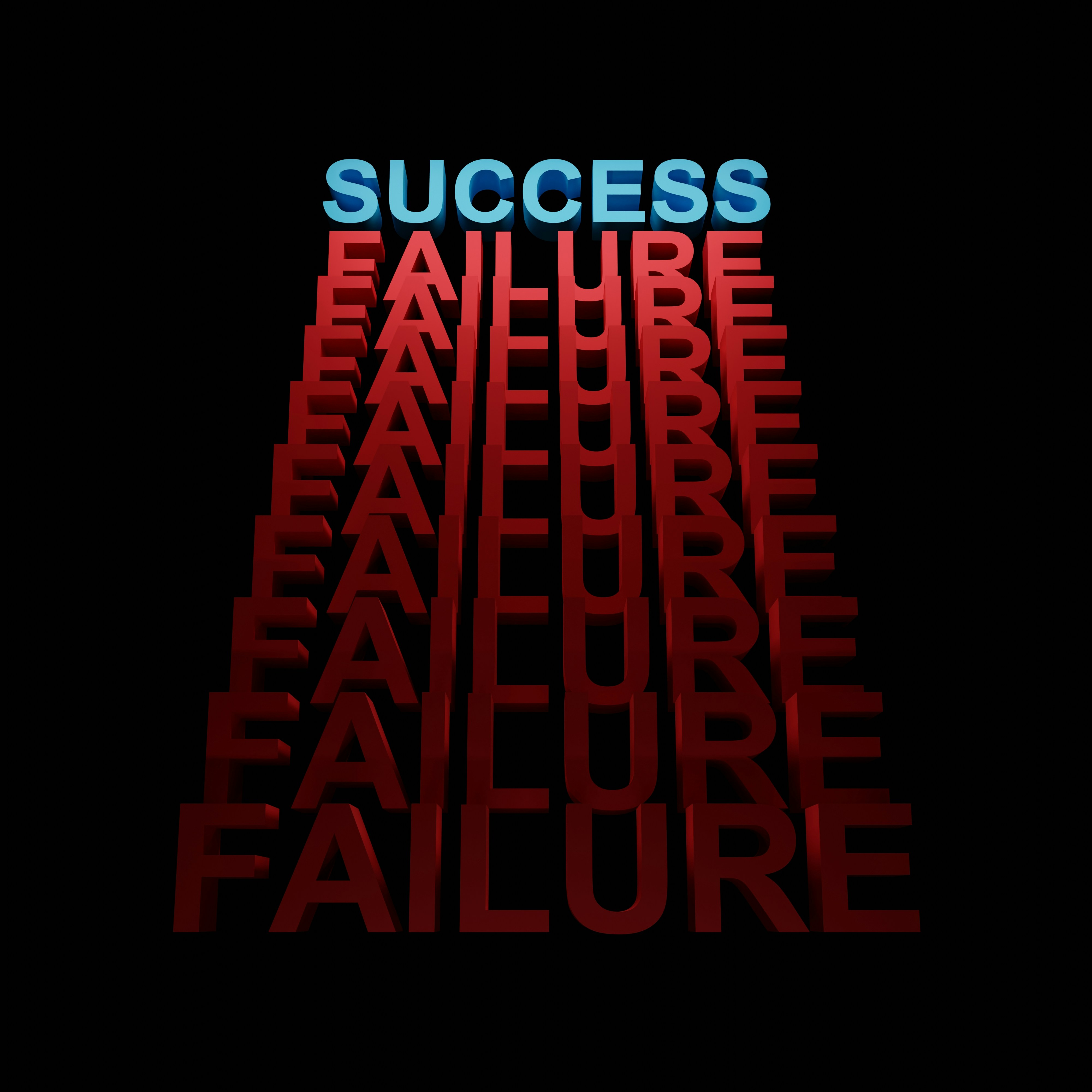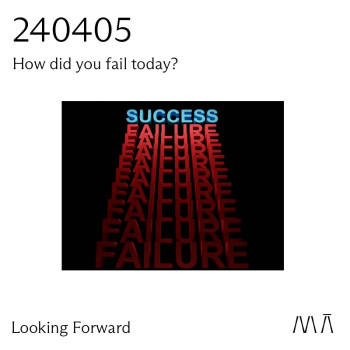How did you fail today?
Is it just me, or do you also rehearse conversations before they happen? Why do we do that, despite having little or no idea what the other person would say? I enter intense rehearsal mode prior to conversations when I expect to hear a ‘no’.
Having a request declined has always felt like an exercise in rejection. To manage crushed expectations, I’ve learned to practise being okay with ‘no’ in advance.
What if I practised being okay with ‘no’ rather than uncomfortable with it? Or in a 180 move, what if I sought out the noes?
Failures, repeated failures, are finger posts on the road to achievement. One fails forward toward success. -
A surprising affirmation
It was a yes. Phew.
I’d been preparing myself for the ‘no’ since I boarded the Heathrow Express. If you’d been on that train with me, you’d have seen me muttering to myself, lo-fi huffing and puffing.
I had spent the fifteen-minute journey conditioning myself. It’s a thing I do: a strategy to help me refrain from freaking out when I get bad news. In this case, the expectation was that the guy at the BA desk wouldn’t let me check in because I was late and I’d miss the flight home.
I’d already had a mild meltdown in my hotel room the day before. Too many things on my schedule. Have you been there?
Too many cars on the road. Taking black cabs wasn’t the panacea I’d expected. I was late. Not late for others, late for myself. The short break I’d carved out vanished thanks to the London traffic. Expectations were crushed.
Back in my room, I beelined for my travel yoga mat. The black rubber roll unfurled making a slapping sound, as I let out my irritation.
Two sun salutations in, I gave up. The space was cramped, the room dark. The plush carpet under the mat made my standing poses wobbly. I laid down on the cushioned surface and put my legs up on the bed instead. Breathe.
It’s okay. Eventually, I started to feel okay.
Self-regulation is a sweet tool to manage life’s many frustrations.
As I rolled my wheelie through Terminal 5, however, I held my head high. I was taking measured and regal strides as if sporting a crown signalling my victory. I made it! I got a yes.
And off I went to take my plane.
When saying no is necessary
As a client, I hate to hear ‘no’.
Having worked in retail for many years, I came to learn to use the word though.
As a manager, I discovered that those employees who say ‘yes’ to everyone have a bad habit of overpromising and under-delivering. A Pandora’s box stuffed full of dissatisfied clients, I came to love saying no. In my own way.
We can’t say yes to everything. Actually, sorry, we can. I hear it’s a curious and exciting lifestyle experiment.
But per the above, in business, yes comes with expectations.
Instead, I started using softer approaches: a grey area between the yes and the no. They involve a willingness to explore the request. Examples of this communication sound like: let me look into it and get back to you later? Let me see what I can do.
Eventually, there are times when we just can’t meet another’s request. But we have shown goodwill, openness and even respect. As a result, the disappointment on the other end tends to be far lower. The experience feels more satisfying. Clients feel like they are heard and seen. Human connection prevails. Scathing online reviews and complaint letters are avoided.
Not every situation (like my flight example) offers this sweet human in-between.
'No' is as essential as my breath regulating technique in our life's toolkit.
But it matters when we say it. And how the (often) dreaded word is delivered.
‘No’ can stand as a verbal boundary, like a wall against unwanted experiences.
‘No’ can feel heavy, like we’re being buried under a ton of bricks.
While one person feels the pressure of the ‘no’, another sees it as a helpful barrier. In any case, we (read: me) need to learn to hear the word ‘no’ and let go of the negativity around it.
After all, I like to use it. ‘No’ is helpful because it cuts to the chase. I hate to be strung along!
Why can’t I get used to hearing it?
Is it the finality that feels so unpleasant?
No means that’s it, the end. C’est fini. It means disruption of the life (or the flight) you had expected.
We're not all equal when it comes to saying 'no'
Some places in the world are better at saying no than others. Non! sums up my experience of living in Paris. I often could feel ‘non’ coming before I’d even finished my sentence.
‘Non’ is the default mode in the French capital. I often wonder how they get anything done.
Surprisingly, we learn how to relate to refusals and rejection as communities. We emulate what we see in our environment. One striking example is how Japanese people have devised tactics to skirt around the word ‘no’ with great verbal skill.
I’ve been in conversations with Japanese team members negotiating how to handle a particular project without ever hearing a clear yes or no. By the end of the call, I had no idea where we stood on said project.
Refusing to say no out of politeness or societal expectations can leave many confused.
Rome, and Italy more generally, is a ‘yes’ place. Occasionally, the ‘yes’ comes disguised as a ‘no’, as in: “Sorry, no lady, we don’t do this.” But upon seeing the disappointment on my face, it morphed into: “Tranquilla! Relax, we can sort this out.”
Switzerland is 50/50. Overall, not a bad place to be.
I'm not even touching the masculine/feminine divide.
Reframing the 'no'
Having a request declined, however minor, has always felt like an exercise in rejection. Some of us feel the frustration more than others.
But given all the benefits of the word, from clarity to boundaries, is there another way to approach the ‘no’?
After all, when we dread it, we’ll try to stay away from situations that may bring the discomfort and frustration that come with it.
Could we learn to turn towards the discomfort instead of shying away from it?
Don't fear the word 'no', seek it out
A friend and I were discussing business the other day, and we both reflected on how much we hated putting ourselves out there — not cold calling (quite) but even pitching.
I later listened to the audio version of David H Sandler’s book You Can’t Teach a Kid to Ride a Bike at a Seminar (second edition) when I heard the author suggesting that instead of fearing them, we seek out the noes. This concept was so relevant to my business chat with my friend that I sent her a copy of the book.
Sandler is not the only one suggesting this reframe.
There’s a shortcut to getting what we want in life. Asking for it directly.
But when act on what we want instead of being a wallflower, we likely will face much rejection.
That’s why it is a daring tactic. And a powerful one.
Raising capital for your business? Better go out and ask investors.
Want a raise? Ask for it, don’t expect it.
Want new clients? Go find them and ask them to listen to your pitch.
Want a hot date? Ask someone out.
I’m not the best at any of the above. Are you?
What would life look like if we could turn this around?
What if we could reframe no, and in doing so, unlock a new perspective and new potential?
Spanx founder Sarah Blakely spoke to James Altucher about her early and relentless exposure to rejection. Altucher was bemused when the billionaire entrepreneur shared her experiences of seven years of cold calling and selling fax machines. This may sound like a nightmare job to many of us. She shared that, on occasion, she was reduced to tears. But it also is what got her ready and resilient enough to launch her visionary brand.
And it turns out she’d been schooled for years to take rejection in her stride:
“All my life I was taught how to deal with failure”, she shared.
“My dad would ask us at the dinner table every night: how did you fail today?”
How did you fail today?
James Bernard, partner to yoga teacher Elena Brower, completed this reframe for me, when he said:
“Be out there so much that you get as many noes, as many rejections as you can, because that means you are pushing yourself.
You are out on your edge.
You are exploring new territory, you are expanding.
You can’t get true, good yesses without a lot of noes.”
In conclusion
Sure, there is an energy that comes with ‘no’ which reroutes our path. No means this is not possible, not like this, not this time. But we can always move past it, or pivot, and explore a new path.
Could you work through the discomfort and expose yourself to more noes?
Don’t forget that it’s only when we dare seek out the noes that we get the great yesses!
‘No’ is an inevitable part of life and business. Let’s not let it break our stride
After all, there is light on the other side.
Going deeper
If you’d like to explore your own relationship with ‘no’, here are some questions for you to journal on:
Identify a goal that’s meaningful to you and ask yourself:
When is ‘no’ an emotional trigger for me?
What story am I telling myself about the ‘no’?
How can I push myself today and put myself out there?
How can I expand myself and be out on my edge?
Ask yourself with pride daily: How did I fail today?

